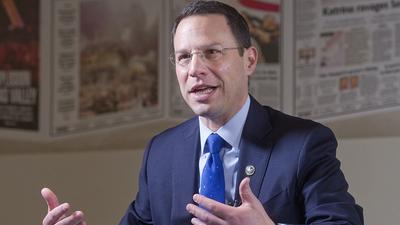Pa. Supreme Court Blocks Release of Priest Sex Abuse Report
By Tim Darragh and Steve Esack
After the court issued its order, state Rep. Mark Rozzi, D-Berks, was distraught and angry, calling the decision “a punch in the gut.” Rozzi, who testified before the grand jury, has spoken publicly, often in graphic detail, about the priest who raped him growing up in Reading. Last week, he held a news conference saying the release of the grand jury report could spur the Legislature to pass a new bill enhancing the legal rights of adults who experienced child sex abuse. On Wednesday afternoon, Rozzi sat in his office, his face in his hands, with a scrapbook of news clippings about child sex abuse issues and a hastily written speech before him. He called the court order a “travesty of justice and an insult to all victims of childhood sex abuse, not just Catholic victims.” He questioned why the Supreme Court would get involved in the release of the grand jury report when state law does not permit that and the high court never issued a stay in any other grand jury report involving child sex abuse and cover-ups. Rozzi added he hoped the court was not trying to protect religious figures and “public officials and community leaders” whom Krumenacker hinted would be identified in his prior order rejecting legal requests to postpone publication. “This is absolutely devastating to many victims,” Rozzi said. “I understand the Supreme Court is going to review legal challenges. So this is not it. We have an opportunity for this report still to still be released.” Several people who testified and advocacy groups say the report’s findings could be devastating to the church, not only because of the abuse but also alleged efforts to cover it up. “It’ll be blistering,” said James Faluszczak, who says he was abused as a teenager by Monsignor Daniel J. Martin, an Erie priest who died in 2006. Court records, news accounts and data compiled by advocacy groups show that more than two dozen priests in the Allentown Diocese or serving the Lehigh Valley outside of diocesan administration have been accused of sexual misconduct going back to the 1960s. The diocesan administration led by Bishop Alfred Schlert — who became bishop after the grand jury was empaneled — said it cooperated fully with investigators. “We welcome the release of the report,” the diocese said in a statement this month. “This story needs to be told, so that we can learn from the report and continue to improve protections for children.” Along with Allentown, the investigation covers the Erie, Greensburg, Harrisburg, Pittsburgh and Scranton dioceses. Last weekend, Scranton Bishop Joseph C. Bambera offered his “deepest apologies to the victims of such abuse, to their families, to the faithful of our church and to everyone impacted by the behaviors described in this report.” The investigation began in 2016 after another grand jury looking at the Altoona-Johnstown Diocese found at least 50 priests or religious leaders had sexually abused hundreds of minors. The report also found many of the allegations were not reported to law enforcement, but instead were covered up by bishops for decades. Grand juries looking into complaints in the Archdiocese of Philadelphia reported similarly explosive findings. The forthcoming report would cover the remaining dioceses in Pennsylvania. More than 250,000 Catholics are in the Allentown Diocese. Across Pennsylvania, 3.2 million people are Catholic, according to the Pennsylvania Catholic Conference. PREVIOUS GRAND JURIES Grand juries also investigated allegations in the state's other two dioceses. 2005: Philadelphia grand jury investigates allegations against more than 60 priests, finding abusive priests were moved around and not reported to police. 2011: Phildelphia's second grand jury focused on the church's practices since 2005, finding many credibly accused priests remained active; charges are filed against three priests, a teacher and Monsignor William Lynn, who was convicted of recklessly endangering children for not removing an abusive priest. His conviction was overturned, then reinstated and he awaits retrial. 2016: A statewide grand jury into the Altoona-Johnstown Diocese uncovers allegations against more than 50 priests and an effort to keep the complaints secret.
|
.
Any original material on these pages is copyright © BishopAccountability.org 2004. Reproduce freely with attribution.
